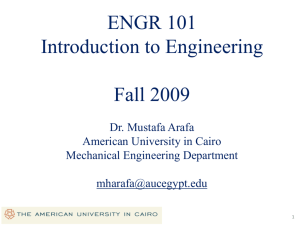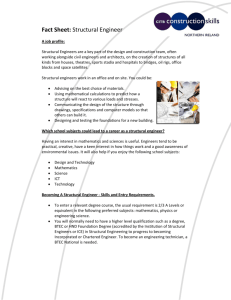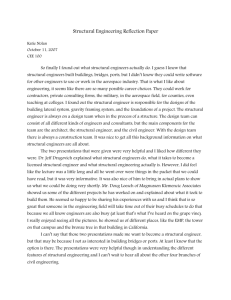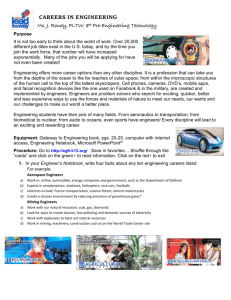Engineering A Team Sport
advertisement
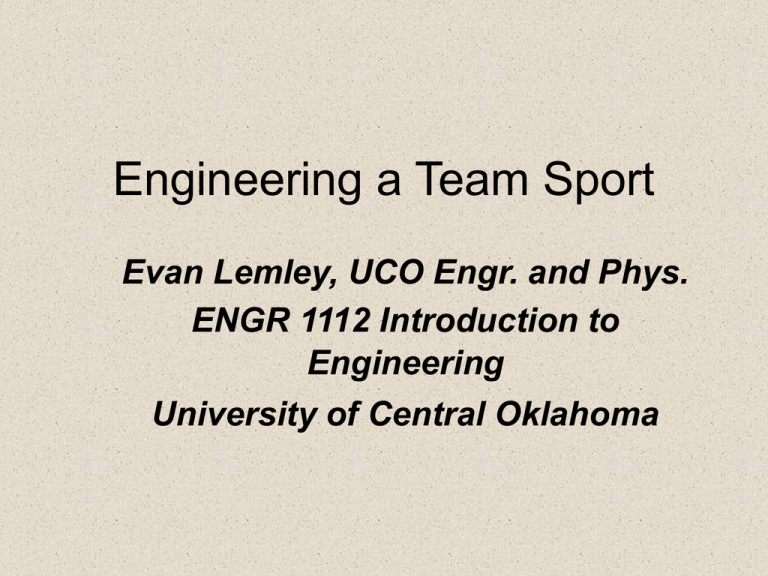
Engineering a Team Sport Evan Lemley, UCO Engr. and Phys. ENGR 1112 Introduction to Engineering University of Central Oklahoma Organization • What is Engineering? • What is an Engineering Team? • Who should be an Engineer and Why? • Engineering Disciplines. • How to become an Engineer. What is Engineering? Compare and Contrast • Engineering – Learn Math and Physics – Apply math and physics to build new devices – Design of applications that solve a given problem is the emphasis • Physics – Learn Math and Physics – Apply math and physics to understand workings of universe – Design of experiments that help understand workings of universe is the emphasis What is Engineering? • Def.: Use of technology to solve problems – Industrial – apply science and math to solve manufacturing problems – Consulting – apply science and math to design things from scratch or assess existing designs – Research and Development – apply newer science and math to create new products and devices – Academic Research – Apply science and math to previously unsolved problems (short term significance may not quite exist) • Help discover new science What is an Engineering Team? • Many problems are solved by teams – Scientists – Generalists, Design, Is there any thing we forgot? – Engineers – Design and Analyze – Technicians – Build, Test, and Debug • Engineering and other work is moving more this direction. • Engineering degree programs are more focused this direction… labs and design projects Cold Fusion – Univ. of Utah Early 1990’s • What: “Table-Top” fusion… really big deal • Who: Drs. Pons and Fleishman • Who else: Team from of Los Alamos • Why: Is it real • How: Neutron and other detectors • What happened: NO NEUTRONS OR ANYTHING ELSE • What kind of Engineers? Columbia Disaster - 2003 • Large Team of Scientists, Engineers, and Technicians • Government – NASA, Industry –Contractors, Independent Board (CAIB) • CAIB – Columbia Accident Investigation Board (www.caib.us) • Cause: Foam insulation hits Leading Edge? – Southwest Research Institute Air Gun Target Foam Impact Is Engineering For You? • Do you like to take things apart and put them back together? (understanding how things work) • Do you like solving difficult problems? • Are you interested in Science and Math? • Do you like working with other technical people? Why Become an Engineer? ASEE • • • • • • • • • • Job Satisfaction Variety of Career Opportunities Challenging Work Intellectual Development Potential to Benefit Society Financial Security Prestige Professional Environment Technological and Scientific Discovery Creative Thinking Why Become an Engineer? Lemley • Fame -probably not • Money -a few rich engineers • Security – pretty secure • Good at it and like it • Idealistic – contribute in a positive way to use of technology Science and Math Requirements • • • • Physics – cornerstone of technology Chemistry Biology Materials – microscopic details of how materials fit together and how they respond to outside forces Math – Engineering is applied mathematics – Algebra, Trig, Calculus, Differential Equations, Linear Algebra • Computers – running software, spreadsheets, wordprocessing, writing programs, CAD, ProE, specific engineering software Aeronautical Engineering • Aerodynamics, Fluid Mechanics • Design and build aircraft, spacecraft, land vehicles • Big companies with large-scale projects Agricultural Engineering • Hydrology, Soil Mechanics, Biology • Produce food on a large scale Engineering Disciplines Biomedical Engineering • Modern engineering methods to solve problems in medicine and human health. • Health and medical-related industries • High growth rate Chemical Engineering • Chemistry to design and manufacture production systems where chemical reactions are involved • Chemistry, fluid mechanics, heat transfer • Petroleum, chemical, plastics, electronics (small – large scale) Civil Engineering • Design and construction of roads, bridges, and other large structures • Wastewater, water supply, erosion, environmental engineering • Government, large construction, and consulting firms Computer Engineering • Hardware, software, and digital communication • Formerly part of electrical engineering • Small – Large Scale Employment Electrical Engineering • Use and control of electromagnetic energy • Microelectronics to power distribution, data communication, fiber optics, power systems, microprocessor design Engineering Physics • Engineering + Physics = EP • Good Engineering Problem Solvers that know the background physics very well • Job Options – Engineer, physicist, software engineer, Graduate School (physics or engineering) • Curriculum = Standard Physics + Basic Engineering Science Courses Industrial Engineering • Design of devices and systems for mass production and manufacturing facilities • Heavy-duty statistics • Industrial Manufacturing employment Mechanical Engineering • Designing and building physical structures • Mechanical Design -- Machines • Fluid/Thermal Design – HVAC – Industrial Processes • Very wide employability Mechatronics Engineering • Mechanical engineering plus electronics plus computers • Solve problems that a mechanical or electrical engineer could not solve alone Naval Engineering • Design of ships, subs, and other seagoing vessels • Oil platforms • Government and private sector Nuclear Engineering • Design of systems that involve nuclear reactions • Reactor engineer, radiation protection • Strong ties to mechanical and to physics • Engineering Physics majors are good nuclear engineers Other Engineering • Petroleum Engineering – Production of oil and gas from resources • Systems Engineering – Design, implementation, and control of large-scale systems (computer, utilities, governments) – Data processing, power generation, transmission, communications, aerospace How to Become an Engineer • • • • • • Bachelor’s Degree Required Engineering vs. Engr. Tech. Engineering Core 1.5 years Math and Physics – 1 year Engineering Physics – more physics Some projects need a “licensed” engineer – Esp. when public use and safety are involved – Approve Design – Some Legal Responsibility How to Become an Engineer • Licensed Engineers are P.E.s – Professional Engineers – Process to be Licensed • Fundamentals of Engineering Exam (FE) – Senior year, General and Specific Sections • Engineering Intern Period (at least four years of engineering practice) • Prof. Engr. Exam (in chosen area) – Not necessary for many engineers – Helpful to be eligible for PE (pass the FE Exam)
